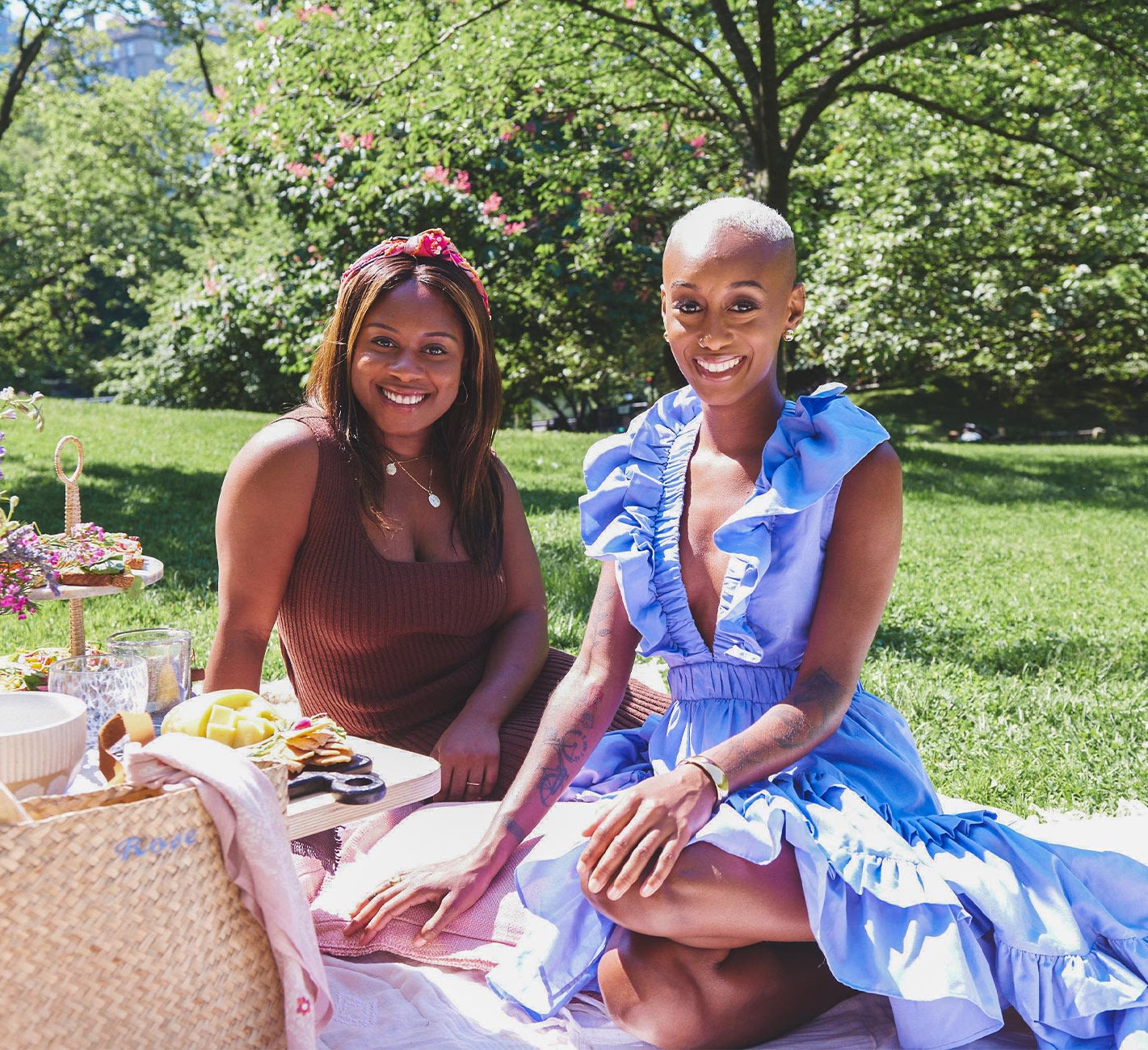To toast the at-long-last return of summer, we gathered a few of our #AnthroAmbassador crew for picture-perfect picnic in NYC's Central Park.
For the menu, we're thrilled to team up with Adá Supper Club, founded by Nkem Oghedo to celebrate Black and female expression through food, and with featured culinarian Chef Brittney “Stikxz” Williams. Adá offers public pop-ups, privately catered events, and customized food experiences delivered to NYC-area doors. We were lucky to grab a minute with Nkem – and a recipe from Stikxz, too!


A Picnic in the Park with Adá Supper Club
Hear from founder Nkem Oghedo on celebrating Black and female expression through food.
Anthro:
Hi Nkem, great to meet you. You’ve worked in consulting and tech, among other fields, so what inspired you to get into the food world?
Nkem:
I’ve always loved food as a consumer – food as fuel, food as joy, food as comfort. I’ve always been intrigued by the way food can remind you of certain things, or tell a certain story, or connect you to other people. As a child, I used to watch endless Food Network and wanted to be a chef when I grew up, until I really learned about how grueling the lifestyle is. But I always had an interest in the industry, and later in life I got more interested in entrepreneurship. I went to business school, and I thought maybe one day I’d invest in a restaurant or something like that. And so I started Adá in January 2020. I had attended another supper club event and thought, “Hey, I could do this!” And my mom has started nonprofits, she's hosted fundraisers, and I’ve been involved and saw how she did it, so almost on a whim I thought, “Let me just start having these dinner parties and see what happens.”
A:
Can you tell us about what inspired Adá’s mission of highlighting Black and women chefs?
N:
Throughout my academic and professional life, I’ve always seen the same narratives. I studied engineering in school [at Yale], worked in management consulting for a number of years, went to business school [at Harvard], and now, in addition to Adá, I work full-time for a tech startup. In all those spaces, I’m usually one of the few women, definitely one of the few Black people, and definitely one of the few Black women. And in all these spaces, despite the obvious contributions that women or Black people made, we were always erased, ignored, and discredited. It’s so rampant in every industry. And that includes the food industry, especially when the food becomes “elite,” like when we talk about James Beard Awards or Michelin stars. Oftentimes we’re very comfortable with a “mom and pop” Jamaican restaurant, for example, but if it’s a “fine dining” Jamaican restaurant, people say, “Why would I spend $30 on some oxtails?”
In some ways, the erasure in the food industry is even more nauseating because of the fact that food is very gendered – as young women we’re told, “You'd better learn how to cook or you’ll never find a man,” but then men are in charge of restaurant kitchens. Make it make sense! And on the race side, there are so many foundational contributions that Black culinary traditions have played. Especially in America, if you think about jobs that were accessible to Black folks at different times in our history, it’s extra infuriating when you think about who does and doesn’t have a seat at the table.
In some ways, the erasure in the food industry is even more nauseating because of the fact that food is very gendered – as young women we’re told, “You'd better learn how to cook or you’ll never find a man,” but then men are in charge of restaurant kitchens. Make it make sense! And on the race side, there are so many foundational contributions that Black culinary traditions have played. Especially in America, if you think about jobs that were accessible to Black folks at different times in our history, it’s extra infuriating when you think about who does and doesn’t have a seat at the table.
A:
How did the pandemic and all its changes, just months after you launched Adá, affect the way you approached things?
N:
I’ll never say I’m grateful for Covid. But there was a pause it forced everyone to take, and for me that was a positive pause. For me and for Adá, that meant really trying to figure out: What’s the real mission of this, what’s the vision, and how can that be in a time when the physical-ness of it isn’t available? And what it came down to was: The point of this is to create space for Black chefs and female chefs to do their thing. It’s about agency. Oftentimes when people are working at "fine dining" restaurants, you’re not allowed to do your own thing, you’re just expected to make someone else’s food – put your head down and chop onions, or whatever it may be. You have no real ownership and there’s certainly no celebration of your own narrative, your own story, your own perspective. And so the purpose I was forced to realize and articulate even stronger was to create space for chefs to tell their own stories, on their own terms, and to celebrate their brilliance and their own expression through food. It could be through food that’s related to their ethnic and national background, or not, because we also need to create space for a chef who happens to be Black to maybe wants to do ramen, or wants to do Italian food, for example.
So my thought process was, OK, if I’m a consumer, a lover of food, but I can’t be in a restaurant, how might I experience these dope food stories? And delivery is something that’s always been a thing and continues to be a thing, so I thought about how to translate the in-person dinner into a box – something you can enjoy at home – and actually make it as multi-sensory as an actual in-person event.
So my thought process was, OK, if I’m a consumer, a lover of food, but I can’t be in a restaurant, how might I experience these dope food stories? And delivery is something that’s always been a thing and continues to be a thing, so I thought about how to translate the in-person dinner into a box – something you can enjoy at home – and actually make it as multi-sensory as an actual in-person event.
A:
How do you find your featured chefs, and how do you work together to create a meal?
N:
So far, I've found them on Instagram! I just looked for folks doing something I thought was cool, inspiring, interesting – they had a particular perspective. They had something to say. I love to play to people’s strengths, so if I’m working with a chef I think is dope, I’m like, “Take it away.” Tell me the food story you want to create, how does that translate on-plate, and let’s make it work. My role is the full experiential aspect, the menu, the storytelling. I think, “OK, what’s the packaging that could make this pop the best, or how could we create some visuals or sounds or video?” I basically work on the marketing, logistics, and coordination. It's like working with an artist and helping to make their art accessible to other people.
A:
Does the name Adá have a meaning?
N:
Yes. I’m Nigerian-American, specifically I’m Igbo – I was born here, and my parents immigrated from Nigeria in the 80s. In the Igbo language, adá means “first daughter,” which I am in my family. Particularly in the Igbo culture (but I think generally in all cultures), first daughters have a lot of responsibilities. You have to lead the way, be there for your siblings, be there for your younger cousins, set the example, support and advocate for folks. I even have an older brother, and when we were hanging out for Mother’s Day, I was still of course doing everything as an adá! So when I think about the supper club, similarly it’s to create a platform that empowers this food family.
A:
What are some of the things we can all do to help advance your vision of seeing Black and women chefs recognized and respected as they deserve to be?
N:
Oftentimes it comes down to supporting women-owned businesses and Black-owned businesses, and supporting individual chefs too. A lot of those I work with are private chefs, so if you’re thinking about your next dinner party or event, maybe look to a private chef versus a restaurant to cater it. Everyone can also learn about diverse foodways and histories. One, it’s fun; two, it’s delicious; and three, it can help open your mind. For example, there’s this awesome show that’s about to debut on Netflix called High on the Hog. It talks about how African-American cuisine has been so influential in the way we eat globally – that type of programming. So support businesses as you can, learn, and just try different, delicious foods!
“As a Jamaican chef, I’m always inspired by fresh ingredients, especially seafood. Light preparation with Caribbean flair is a must. So when I think of my ideal picnic eats, a lobster roll is the first thing that comes to mind!”
Scotch Bonnet Lobster Rolls
By Chef Stikxz
Ingredients
Makes 5 servings
4 ounces unsalted butter
1/2 Scotch bonnet pepper, deseeded and chopped
1 clove garlic, microplaned or minced
1 small sweet onion, small diced
2 pounds Maine lobster meat, cooked
1/4 cup fresh parsley, roughly chopped
5 brioche hot dog buns
Sea salt to taste
Scotch Bonnet Aioli:
1 cup mayonnaise
1/2 cup extra-virgin olive oil
1 Scotch bonnet pepper, deseeded
1 small shallot, small diced
1 cup lemon juice
1 tablespoon lemon zest
1/4 cup dill fronds
Leftover butter sauce (from sauté pan after removing lobster)
Sea salt to taste
Black pepper to taste
Instructions
1) In a sauté pan, melt butter over medium-high heat. Once melted, with a wooden spoon, stir in Scotch bonnet.
2) Add garlic (grating first if microplaned) and sauté until aromatic.
3) Add sweet onion and cook until translucent.
4) Add lobster, combine, and cook for one minute.
5) Turn off heat, season with salt to taste, and add chopped parsley.
6) Remove the lobster meat with tongs and place in a small container to refrigerate.
7) In a food processor, pulse all the aioli ingredients until completely combined. Season to taste.
8) Once the lobster is fully cooled, toss in the aioli until coated. Spoon lobster mixture onto buns and serve.
Follow Adá Supper Club on Instagram @adasupperclub for more!
1) In a sauté pan, melt butter over medium-high heat. Once melted, with a wooden spoon, stir in Scotch bonnet.
2) Add garlic (grating first if microplaned) and sauté until aromatic.
3) Add sweet onion and cook until translucent.
4) Add lobster, combine, and cook for one minute.
5) Turn off heat, season with salt to taste, and add chopped parsley.
6) Remove the lobster meat with tongs and place in a small container to refrigerate.
7) In a food processor, pulse all the aioli ingredients until completely combined. Season to taste.
8) Once the lobster is fully cooled, toss in the aioli until coated. Spoon lobster mixture onto buns and serve.
Follow Adá Supper Club on Instagram @adasupperclub for more!
